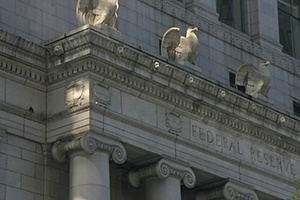 I’m in New York today at the Goldman Sachs Asset Management Symposium, an annual event where a range of speakers discuss the markets and the world, with an eye to what might impact the future. I’m grateful to be here, listening to these smart people and trying to predict what the coming years may bring.
I’m in New York today at the Goldman Sachs Asset Management Symposium, an annual event where a range of speakers discuss the markets and the world, with an eye to what might impact the future. I’m grateful to be here, listening to these smart people and trying to predict what the coming years may bring.
Perhaps the most interesting part of the conference is what people choose to talk about. So far, the primary topics of discussion have related to politics rather than economics, which highlights two core facts:
- The underlying economics, both in the U.S. and around the globe, are essentially favorable.
- Even as the economy improves, what matters at the margin continues to be politics.
I'm referring to politics in the broadest sense, of course, including what is commonly seen as government (Congress, the White House, foreign governments) and other elements that act in a governmental policy capacity, such as central banks.
Economic fundamentals slowly moving back to the fore
I've written before about the transition in recent years from a focus on policy to economic fundamentals, and that remains true. But clearly, at the highest levels, that transition is not complete, and there's no sign that it will be any time soon.
Policy has always mattered. Following the Fed, for example, has a long and distinguished history. And government action obviously determines the broad context of markets, through regulations and taxes, if nothing else. What’s been different since the financial crisis is that policy has been the primary factor, not a contextual factor. Although that's been fading, the fact that policy still draws this level of concern has important implications for the future.
Right now, for instance, if economic conditions were to worsen, as they inevitably will at some point, policy will be both quicker to move back to center stage and more likely to assume an even more important role. In other words, although policy may be largely off the table right now, it could come back sooner and bigger than expected if things get difficult.
Don’t count out policy’s influence just yet
For us as investors, this might mean that the next downturn isn't as bad as it could be. The Fed and the government may step back in more quickly and with more force because they’re scared of the potential consequences. This also applies around the world, for the same reasons. Despite the current composition of the U.S. government, a real scare could focus minds quite quickly.
When we look at the past two cycles, in 2000 and 2008, policy tended to trail the actual downturn, in both the economy and markets. Looking back, faster and stronger action could have averted many of the consequences—a lesson not lost on current policymakers. With policy still very much in the mix, and with a recession inevitable at some point, we need to reevaluate what the future may look like.
The Fed and the government may be with us, as investors, for far longer than we think.


 Print
Print

